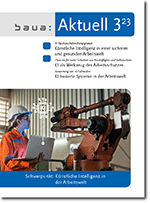Artificial intelligence is a crucial driver behind the digital transformation and is altering the world of work profoundly. As a result, highly promising opportunities are opening up for positive approaches to the design of work. Because of this it is imperative to reimagine human-centred work design. AI is not just affecting products and work equipment, but also having impacts on the design of work activities, workplaces, processes, and management roles.

Sweeping changes in the world of work
Artificial intelligence (AI) is penetrating organisations and, as this happens, coming to be used in many different settings. The assessment of its opportunities and risks from an occupational safety and health (OSH) perspective and its human-centred implementation are particularly challenging. This is because AI applications are continuing to develop at a rapid pace and the diversity of technologies and systems classifiable as AI is enormous.
Apart from the debate about the potential effects of AI on the labour market, researchers will have to address numerous questions concerning AI in the world of work that demand the exhaustive scrutiny of AI technologiesThese discussions will have to take account of digital and ecological transformation processes and the requirements for AI’s sustainable implementation.

baua: Aktuell 03/2023 includes a focus section on artificial intelligence in the world of work. This issue features other articles covering the second report from the Council of the Working World (Rat der Arbeitswelt), with its recommendations concerning the management of the digital and ecological transformations, and the launch of EU-OSHA’s “Safe and healthy work in the digital age” campaign.
baua: Aktuell - Issue 3/2023 (in German)
Challenges from AI
AI is altering work systems at the micro, meso, and macro levels. This is true of work tasks, activities, processes, and organisations alike, as well as new kinds of work equipment. Such equipment includes, for example, collaborative robotics, self-learning systems, smart protective clothing, work assistance systems, and driverless transport systems. It is necessary to respond to these radical innovations by bringing human-centred approaches to bear on the management of role allocation and the interactions between human beings and (AI-supported) work equipment.
New or heavier work loads may be placed on employees as a consequence of AI being utilised in the world of work. This could happen, for example, due to rising work intensity, a growth in the volume of repetitive work, and deskilling, but also the tendencies for technical systems to become less transparent and increasingly complex. This would increase workers’ dependence on technology and the dangers of social isolation associated with that dependence, while lowering their levels of control. OSH criteria accordingly have to be tested, adjusted, and further refined so that it is possible to keep pace with innovations in the AI field. These innovations will make appropriate adjustments necessary, potentially on the part of regulators as well. Since learning AI technologies’ behaviour develops while they are in use, they will throw up additional challenges that have to be tackled when carrying out risk assessments and preventive assessments of the hazards from machines and reconfigured activities.
AI’s potential benefits
Nonetheless, AI applications can also provide employees with meaningful support and bolster OSH provision. Today’s cognitive assistance systems are already capable of supplying information about loads and stressors, thus positively influencing employees’ health habits. Thanks to AI, it is feasible for body sensor networks to improve the measurement of physical stresses. AI-based image evaluation procedures will soon be assisting the detection and classification of microscopic hazardous substances. If they are well designed, AI technologies can offer means of easing the burden of repetitive tasks. It is, in principle, possible to design AI systems transparently and explicably. New opportunities are also opening up, in particular, to design work in ways that promote inclusion by putting in place options for individual support.
The Federal Institute for Occupational Safety and Health (Bundesanstalt für Arbeitsschutz und Arbeitsmedizin, BAuA) has completed various research projects looking at a range of subjects connected with AI, including questions about industry 4.0, ambient intelligence, and data mining. Other research projects on AI-adjacent issues are still ongoing at present. A selection of the topics connected with AI we are currently researching are presented below.



